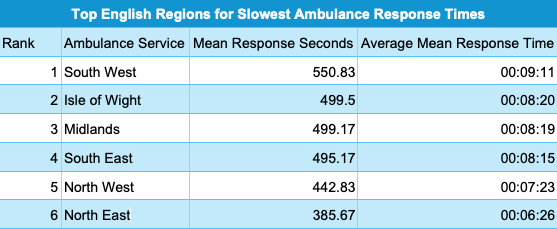A NEW study reveals the South West of England has the slowest ambulance response times for life threatening emergencies in England.
The study, carried out by Releaf, analysed NHS data from the year so far, revealing a sharp divide in ambulance response times across England, with the South West emerging as the slowest-performing region in the country for life-threatening emergencies.
The findings, taken from NHS England’s AmbSYS time series data, cover January to June 2025 and focus on Category 1 calls, which include cardiac arrests, patients who have stopped breathing, and other immediately life-threatening incidents.

The national NHS target for Category 1 calls is an average response time of 7 minutes. While services in the North East and North West meet or come close to this benchmark, South Western Ambulance Service averaged over 9 minutes, the slowest of all ambulance services analysed.
Several factors may be contributing to the South West’s slow performance, say Releaf. The trust covers more than 10,000 square miles, one of the largest service areas in England.
A study published in the International Journal of Health Geographics found that patients in the South West live a median of 12 kilometres from the nearest emergency hospital, with some located as far as 50 kilometres away, resulting in drive times of up to 48 minutes in the most remote areas.
The South West Ambulance Service also faces challenges with increased seasonal demand due to tourism, with over 65 million overnight stays per year, the highest out of all English regions.
A spokesperson for Releaf said: “The disparity in response times underscores a growing concern that emergency care access is being shaped not by clinical need, but by geography.
“As ambulance services across England strive to meet performance targets, the South West’s slower response times raise questions about regional variation and access to emergency care across England.”




.jpg?width=209&height=140&crop=209:145,smart&quality=75)
Comments
This article has no comments yet. Be the first to leave a comment.